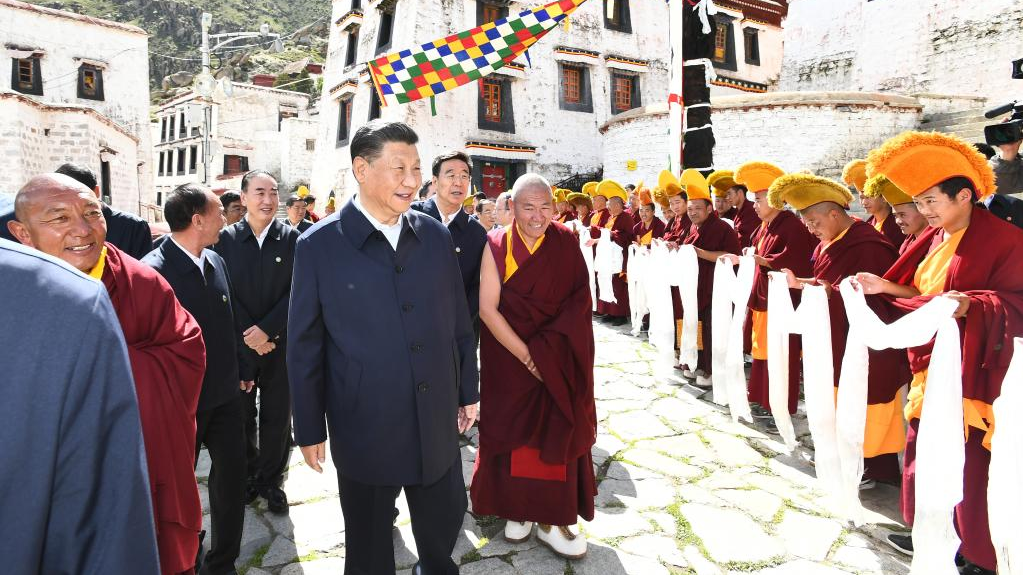
Chinese President Xi Jinping, also general secretary of the Communist Party of China (CPC) Central Committee and chairman of the Central Military Commission, inspects the Drepung Monastery located in the western suburbs of Lhasa, southwest China's Tibet Autonomous Region, July 22, 2021. /Xinhua
Chinese President Xi Jinping, also general secretary of the Communist Party of China (CPC) Central Committee and chairman of the Central Military Commission, inspects the Drepung Monastery located in the western suburbs of Lhasa, southwest China's Tibet Autonomous Region, July 22, 2021. /Xinhua
Editor's note: John Gong is a professor at the University of International Business and Economics and a research fellow at the Academy of China Open Economy Studies at UIBE. The article reflects the author's views and not necessarily those of CGTN.
On the background of the 70th anniversary of Tibet's peaceful liberation, Chinese President Xi Jinping visited the Tibet Autonomous Region in the last few days. This is the first visit by a Chinese top leader in the last 30 years, rightfully serving as an extraordinary success of transforming Tibet from a backward serfdom society into part of a thriving modern Chinese civilization.
Xi's first stop in Nyingchi and his subsequent train ride to Lhasa signify Tibet's close relations with Chinese heartland. Opened just last month, the railway between Lhasa and Nyingchi traverses more than 435 kilometers of rugged terrain, often with freezing temperatures for a large part of the year.
The venerable Chinese railway technology in the Qinghai-Tibet Plateau is a great engineering feat in itself. Over a time span of 40 years, we built the highest, the longest, the hardest and yet the most beautiful railroad in the world into Lhasa, costing billions of yuan. Many people even sacrificed their lives during construction to make the dream come true. And now we have extended the Qinghai-Tibet railway to Nyingchi, a beautiful city in the eastern part of Tibet on route to Sichuan Province.
In the old days before 1951, the route between Lhasa and Nyingchi would take almost a month to complete, riding on horseback. Today, the trip by President Xi a few days ago took only three hours.
As I checked Ctrip, there are three daily trains in each direction between the two cities now, ranging from three to four hours for a one-way trip. Nothing can signify more dramatically what the central government has brought to Tibet in the last 70 years than our shortening of that almost one-month trip to about only three hours.
Railway certainly is not the only thing that has been brought to Tibet. We built schools there. We built thousands of them. Today, close to 100 percent of school-age children in Tibet are attending school, learning both Tibetan and Mandarin languages. The illiteracy rate is less than 10 percent.

Chinese President Xi Jinping, also general secretary of the Communist Party of China (CPC) Central Committee and chairman of the Central Military Commission, waves to villagers while inspecting Galai Village of Nyingchi, southwest China's Tibet Autonomous Region, July 21, 2021. /Xinhua
Chinese President Xi Jinping, also general secretary of the Communist Party of China (CPC) Central Committee and chairman of the Central Military Commission, waves to villagers while inspecting Galai Village of Nyingchi, southwest China's Tibet Autonomous Region, July 21, 2021. /Xinhua
Since 1978, the central government has spent billions to finance the restoration and maintenance of all the Lamaist monasteries in Tibet. Today, close to 100 percent of Tibetan monks are on government payroll, never having to worry about the next tithes to feed on.
We preserve the Tibetan cultural through studies of its history and literature. We researched Tibetan medicine. We built roads, highways, hotels, factories, power plants, residential housing, and shopping malls. We emancipated people from the shackles of poverty and illiteracy, empowering them to pursue their dreams.
Look at the reception crowd gathered to greet Xi at the airport, the amount of Khata bestowed upon President Xi and his motorcade, and the improved living standards of the people in Tibet. It is so overwhelmingly evident that the new Tibet's 70 year history is a resounding triumph of civilization for mankind.
President Xi made several brief speeches along the way, and he can't emphasize enough about the importance of environmental protection and ecological preservation. At a bridge where the Nyang River meets the Yarlung Tsangpo River, the two major rivers in Tibet, he used the words "pure land" to describe that area, and instructed the chief of the Tibetan Ecological and Environmental Protection Bureau to absolutely safeguard the area. There is no doubt that tomorrow's Tibet will be even cleaner, greener, and more beautiful than ever.
(If you want to contribute and have specific expertise, please contact us at opinions@cgtn.com.)

